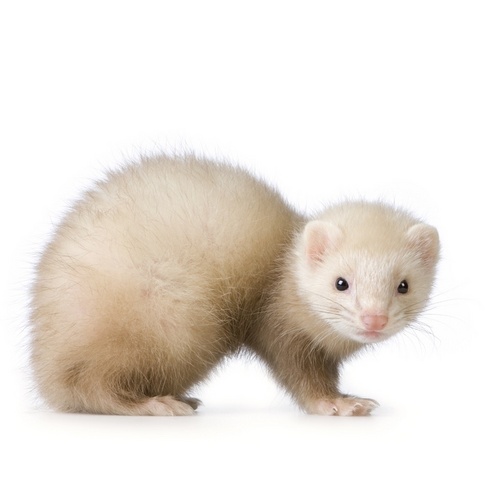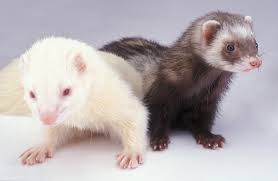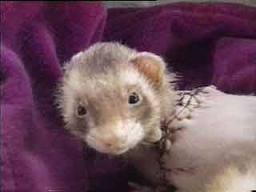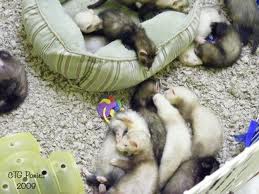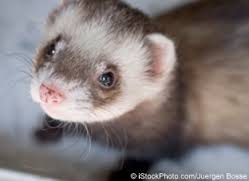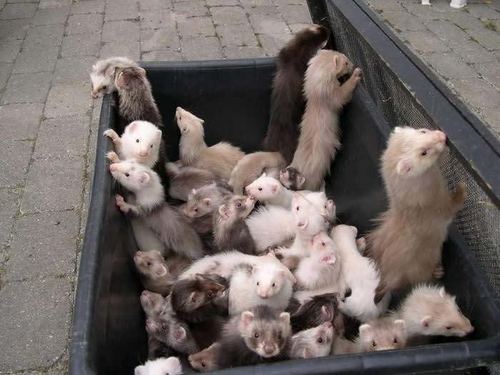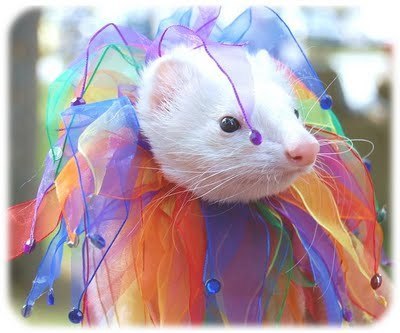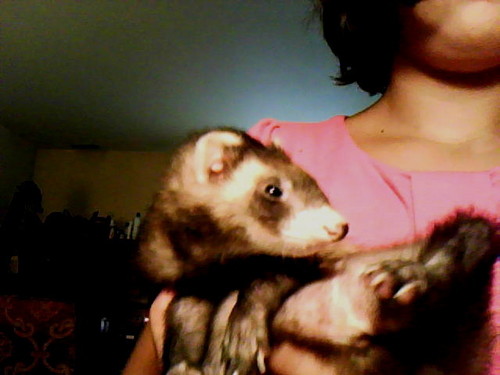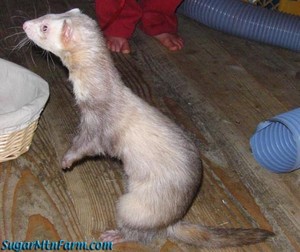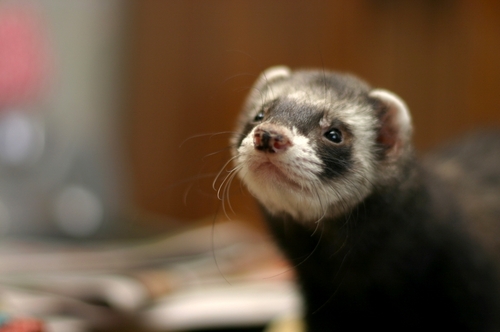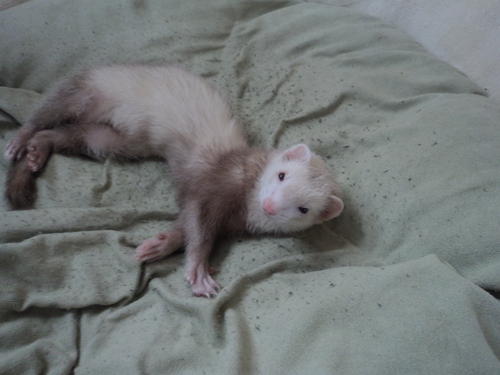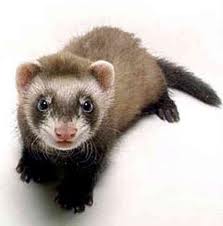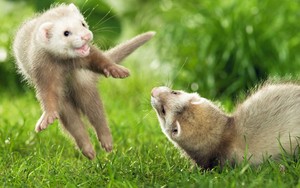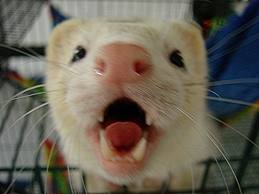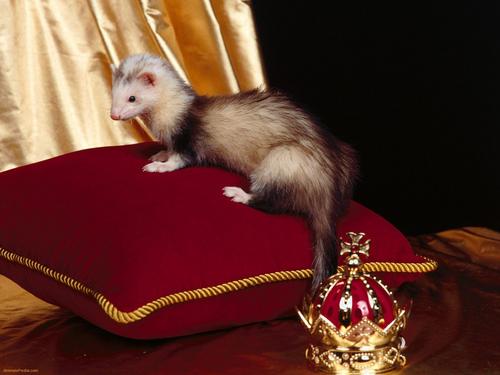Caring for your FIRST Ferret
Whether te are considering adopting a furetto from the furetto Information Rescue Shelter & Trust Society, are planning to purchase one from a pet store, o have one of your own, FIRST wants to help te provide the best possible home and care for your pet. To this end, we have prepared this brochure to explain briefly some of the habits and concerns of these active and affectionate animals.
General
The average life span of a furetto is 6 to 8 years. When fully grown, females weigh about 800 grams (1.5 lbs) while males are generally about 1.2 kg (2.5 lbs). A female's length is about 30 cm (12 inches) nose to tail and the males are about 45 cm (16 inches).
Ferrets come in many colour variations: Most are shades of brown, gray and black with the mask, feet and tail ("points") generally being the darkest in colour. The red-eyed white breed of ferret, commonly called an "albino", was bred for the trait of eye colour. These animali suffer from some vision problems due to this breeding, mostly related to difficulties with bright light.
Behavior
Ferrets have powerful, distinct and engaging personalities, with a playful and fastidious nature. They are very gregarious and are happiest in pairs o larger groups.
Ferrets are half-light creatures with their periods of greatest activity just before sunrise and shortly after sunset. They sleep about eighteen to twenty hours of the day, waking up twice a giorno for very active periods of about two hours. Due to their very high metabolism, ferrets also awaken roughly every four hours for a few minuti to eat, relieve themselves and play briefly. When they wake, ferrets shiver noticeably for periods up to twenty minutes. This is normal as the furetto is increasing his body temperature after sleep due to his high metabolism and inherently higher body temperature.
As burrow-living animals, ferrets require a dark, quiet place to sleep. The most suitable places are boxes and drawers with bedding of old towels, sweaters, pants and the like in which they can roll up o bury themselves.
Ferrets are extremely curious and will investigate anything and everything. This curiosity is the leading cause of accidents amongst ferrets. It is important to supervise your furetto at all times when he is at play. When te allow your ferrets to roam about your home, never close refrigerators, washers, driers, etc. without first ensuring no ferrets are exploring o roosting within.
Litter Training
Ferrets are latrine animali and prefer to use specific areas for this purpose. Generally, a furetto will relieve himself within a few minuti of waking up. Being small predators, ferrets would be in the middle of the Cibo chain in the wild, so their instinct is to find a sheltered corner as a latrine. This makes it possible to litter train a furetto with considerable success.
The furetto should have a litter box o paper placed in a corner near his nest o in his cage and be confined to the nest/litter area until after he has relieved himself. Afterwards, he can be released to play in the rest of the home, as he will not relieve himself again until after his successivo sleep. The size of the training area can slowly be expanded as the furetto learns to use a specific area, much like paper training a puppy. A litter box can be placed in a secluded, out-of-sight corner with a piece of furniture providing cover on the third side of the box. Place a litter box in each room for the ferret's use, and his natural preferences should guide him to it. The use of a fine, dust-free, clumping litter in a litter box o newspapers is suggested. Remember to clean up daily.
Play & Nipping
Ferrets are very playful animals, much like gattini o Cuccioli that never grow up. They have many behaviours related to play and play "hunting" which confuse o even frighten people unfamiliar with furetto body language.
The most common action is the "war dance," where the furetto arches his back, throws his head back with fangs bared, often bushing up his tail, and maniacally bounces forward, backwards, sideways, all the while chittering happily away. As seemingly mad as this dance may seem, it is only a challenge to come down to his level and play. If te imitate his actions, he will become più frenzied (hard to imagine though this may be) and start chasing you, stop suddenly, turn and run. Now it's your turn to chase him.
Another common message is pawing the ground while semiprone: This is a challenge to a play fight. Paw the ground yourself, and he will jump at you, and then retreat. A few più bouts of pawing and jumping, and he will attack your hand o wrist, wrestling it down and attempting to "kill" it.
All ferrets have an affinity for people and want to include their parents in their play. This is a major bounding component in a ferret's life. Due to his extremely strong jaws and small, sharp teeth, a young furetto easily can break a person's skin during these games. The ferrets' thick pelliccia and skin protects them when they play together. It takes a while for them to realize that humans have only thin skin and no fur, which is no protection against bites. When the furetto bites o nips too hard, simply do what is natural and yelp in pain. Once they recognize that they are hurting us, ferrets modify their play so as not to do damage. This rough play is an essential part of a ferret's life, especially when young.
Nipping, that is pinching the skin hard without breaking it, is another invitation to play. Some kits never nip, but most do and, though they do mellow with age, this is a normal communication process with ferrets.
Care
Housing
Ferrets are active, curious animali that should be allowed to run free when awake and be caged only when required for safety. Should te not be able to allow the animali a large area with toys to roam about freely and explore, then ferrets are not the pet for you.
When it is necessary to confine your pets, they should be kept in a cage large enough to allow separate sleeping, eating, litter and play areas. Generally, a cage of 1 metre da 1/2 metre (40 inches da 20 inches) can house one to three ferrets comfortably for a short period of time o for travel. If confined for too long, they become frustrated and claw o gnaw at the cage, resulting in dental damage. When it is necessary to keep the animali caged, exercise in a large area conducive to exploration for periods of two to three hours twice a giorno is advised. Remember that a cage is a dangerous place for animali that roughhouse when playing. Make sure that there are no exposed wires, gaps between wires that could catch toes and nails, loose doors o panels that can catch a head, o perch-like shelves that the ferrets can fall from when playing.
Ferrets Amore to tunnel, so their favourite beddings are sheets, towels, blankets, sweaters and such. These items are ideal for ferrets to snuggle into, but ensure that sweaters and blankets do not have decorations on them that the furetto can pull off and swallow.
SSmall cardboard boxes, bags of plastic and paper, throw rugs and towels, white socks and clean linen: These are some of a ferret's preferito things. Fancy toys are nice for humans, but the child in the furetto enjoys the things he can crawl into, under, and through, like drainage pipe and box lids. The leavings of the latest shopping expedition (bags, boxes, etc.) are the greatest gift mankind can bestow upon a ferret.
Food
Ferrets are exceptionally playful, so expect your furetto to tip over his Cibo and water bowls. Check on them often, tape them down, use a heavy dish o place a rubber mat underneath for spillage.
Do not use water bottles for ferrets: These are unsanitary, damage teeth and do not allow a dehydrating furetto to get enough water to survive. Ferrets also wash their faces in water, so an open fonte is necessary for their hygiene.
Because ferrets have such rapid metabolisms, they awaken to eat about every four hours. Fresh water and Cibo should always be available to them. Ferrets eat only what they need and leave excess Cibo for later, so one need not worry about over feeding.
Ferrets must be fed a high quality dry furetto o kitten food. Hard Cibo keeps the ferrets teeth clean and makes their feces less smelly. The Cibo should contain from 32% to 36% protein (half of which should be derived from meat), at least 18% fat, minimal ash and the supplement taurine to prevent urinary tract problems. There is no need to change diet for older ferrets. Be aware that some furetto foods contain high quantities of pesce meal, oil and by-products. These types of Cibo are based on visone feed and do not meet the nutritional needs of ferrets, who are not aquatic and will shun them (a hint). They are generally soft, causing plaque and tartar buildup on the teeth, and also give the animal an unpleasant smell. Also to be avoided are foods with added flavours o gimmicks, like raisins, to induce the furetto to eat.
Like all carnivores, ferrets enjoy frutta and sweet vegetables such as grapes, bananas, apple, melon, carrots, cucumber, etc. as a dietary complement. Every furetto has it's own preferences. Remove Skins that are tougher than a uva peel and slice stringy items like sedano into thin slices rather than sticks to avoid intestinal blockages. Dog biscuits (for small dogs) also make a healthy snack. Give dairy products and dried fruits sparingly as ferrets are somewhat lactose intolerant and dried frutta is difficult to digest. Avoid nuts and grain products, as the animali cannot digest these, and treats that could be swallowed whole, as ferrets do not have grinding molars like us. latte and latte products in small amounts are also acceptable.
Vitamin supplements are not necessary if the ferrets are fed high quality Cibo and fresh fruit. However, many ferrets Amore Linatone o Ferritone vitamin supplements, which are dato as reward for good behavior o a distraction when clipping nails and such. No più that 3 drops per giorno should be dato to your furetto as an excess of certain vitamins can cause medical problems including pelliccia loss and blindness. We recommend feeding fresh frutta rather than using a supplement. Nutri-Cal and Ferretvite are other supplements used mostly for ill o undernourished ferrets, though they can be used as healthier treats for ferrets instead of Linatone o Ferritone.
Health
Yearly Veterinary Visit
As a furetto anno is the equivalent of a decade in a human's life, te will need to take your furetto to your veterinarian two o three times a anno for a medical checkup, with yearly vaccinations once a year. Ferrets require yearly inoculations against canine distemper to which they are highly susceptible and it is always fatal. dato the frequency of distemper outbreaks, do not forget to inoculate against this every year!
If your furetto is outside for any length of time o exposed to other animali that are, a rabies vaccination is also suggested. Be aware that proof of a valid rabies inoculation is required when taking your pet across international borders.
Include a dental examination for your pet also. Though ferrets seldom develop cavities, check your ferret's teeth regularly as many ferrets break their fangs when playing. This can cause excruciating pain and make the animal cranky and bitey. Supplementing your ferret's diet with a Cibo formulated to clean teeth and massage gums (e.g. Hill's Prescription Diet Feline T/D) will reduce the likelihood of dental problems. Such foods are available only through veterinarians.
Spaying & Neutering
All ferrets should be fixed before they reach sexual maturity as this will drastically reduce their odour and it will extend their lives. Female ferrets go into heat in their first spring (generally in February) and they will remain in season until successfully mated. If mating does not occur, the females can succumb to aplastic anemia and die a most unpleasant death. te will greatly increase your female ferret's life span if te have her fixed before she goes into season.
As ferrets are very difficult to breed successfully and the risk of losing the jill, her kits o both is very high, the breeding of ferrets should be left to experts with on-site veterinary support.
Ferrets attract mates through the use of pheromones, giving the unaltered animali a very pungent aroma which most people find unpleasant. Unfixed males have a strong musky odour and will mark their territory with urine.
When a furetto is altered (spayed o neutered) its odour will be eliminated almost entirely. Thereafter, bathing when the scent becomes strong (once every mese to six months, depending on the weather, activity level, food, etc.) should be all that is required. However, ferrets, like all animals, will retain a slight odour.
Be a responsible pet owner and have your pets neutered o spayed. This increases your pleasure in your pets and makes them più attractive to others.
Odor and De-scenting
One of the most common statements about ferrets is that they have a bad smell. Most of a ferret's odour results from the influence of sex hormones on normal skin secretions. These secretions are drastically reduced when the furetto is altered.
Being distantly related to skunks, ferrets also have anal scent glands that they can release at will, though they rarely spray unless they are fighting, mating o frightened. Descenting involves the removal of these scent glands, which are located at the base of the tail. Although ferrets do not need to be descented, if te wish to eliminate the possibility of an unpleasant experience should your pet be frightened in a public place, consider having this done. It is a minor operation roughly equivalent to a human appendectomy in seriousness and discomfort. Your furetto will be back to his active self in two o three days and he will never miss this natural defense. This increases your pleasure in your pet and makes him più attractive to others.
If your furetto is altered and descented and still has a strong odour, the cause is usually the food. Change your ferrets diet - remember, if the Cibo smells bad, so will the animal.
Hygiene
Once your furetto has been fixed and descented, your furetto will require a bath only every few months. Use a good quality "no-tears" human shampoo, preferably with a conditioner, which allows te to wash the furetto from nose to tail without causing any discomfort to the eyes. Be sure to wash around your ferret's neck and face, as there are additional scent glands located on the cheeks.
Intestinal Obstructions
A common cause of premature death in ferrets is the intestinal obstruction. Many ferrets will chew on soft rubber and other small objects. Objects can become lodged in the ferret's intestine, causing an agonizing and slow death unless surgery is performed immediately to remove the obstruction. Many other items can be just as deadly: Doll feet o hands, erasers, ear plugs, sponges, coffee beans, small buttons, shoe inserts and other foam rubber items, etc. Be careful and use your common sense as te would if te had a toddler at home. Fortunately, most ferrets outgrow this rubber fetish once they have left kithood, but it is best to take no chances.
Do not feed your furetto grain-based foods (breads, cakes, cookies, cereals, noodles, etc.), nuts, o fibrous fruits and vegetables. These items are indigestible to ferrets and can result in various digestive problems, including blockages.
Warning signs of a blockage are listlessness, problems passing a stool, passing a thin and/or mucousy stool, refusal to eat o drink, and vomiting after eating o especially drinking. If te suspect a blockage, take your pet to your veterinarian immediately!
Illnesses
Ferrets can catch the human influenza and cold viruses and they can pass them back. If te have a cold o the flu, be sure to wash your hands before touching your ferret. Keep the furetto away from your face and do your best not to give your cold to your ferret.
Ferrets are also susceptible to canine distemper and rabies (see above). Other common diseases are adrenal and pancreatic tumors, cardiomyopathy, Aleutian disease, bronchial pneumonia and other viral infections. Most can be effectively treated dato early diagnosis.
As ferrets tend to deteriorate quickly if they become ill due to their high metabolic rate, it is important to provide proper veterinary care immediately.
Ferrets are dry, temperate climate creatures who suffer from warm temperatures and the damp. They should be kept indoors rather than outside and when the temperature exceeds 20ø C (72ø F) they should be kept in a cool, shaded place with fresh water in bowls. Ferrets do have sweat glands, but their thick pelliccia prevents body cooling da evaporation, making them very susceptible to heatstroke and dehydration. Even if temperatures do not reach such an extreme, the ferrets are often left damp from sweat and sensitive to chills from sudden cooling afterwards. Leave your pets at home with lots of water on hot days.
Whether te are considering adopting a furetto from the furetto Information Rescue Shelter & Trust Society, are planning to purchase one from a pet store, o have one of your own, FIRST wants to help te provide the best possible home and care for your pet. To this end, we have prepared this brochure to explain briefly some of the habits and concerns of these active and affectionate animals.
General
The average life span of a furetto is 6 to 8 years. When fully grown, females weigh about 800 grams (1.5 lbs) while males are generally about 1.2 kg (2.5 lbs). A female's length is about 30 cm (12 inches) nose to tail and the males are about 45 cm (16 inches).
Ferrets come in many colour variations: Most are shades of brown, gray and black with the mask, feet and tail ("points") generally being the darkest in colour. The red-eyed white breed of ferret, commonly called an "albino", was bred for the trait of eye colour. These animali suffer from some vision problems due to this breeding, mostly related to difficulties with bright light.
Behavior
Ferrets have powerful, distinct and engaging personalities, with a playful and fastidious nature. They are very gregarious and are happiest in pairs o larger groups.
Ferrets are half-light creatures with their periods of greatest activity just before sunrise and shortly after sunset. They sleep about eighteen to twenty hours of the day, waking up twice a giorno for very active periods of about two hours. Due to their very high metabolism, ferrets also awaken roughly every four hours for a few minuti to eat, relieve themselves and play briefly. When they wake, ferrets shiver noticeably for periods up to twenty minutes. This is normal as the furetto is increasing his body temperature after sleep due to his high metabolism and inherently higher body temperature.
As burrow-living animals, ferrets require a dark, quiet place to sleep. The most suitable places are boxes and drawers with bedding of old towels, sweaters, pants and the like in which they can roll up o bury themselves.
Ferrets are extremely curious and will investigate anything and everything. This curiosity is the leading cause of accidents amongst ferrets. It is important to supervise your furetto at all times when he is at play. When te allow your ferrets to roam about your home, never close refrigerators, washers, driers, etc. without first ensuring no ferrets are exploring o roosting within.
Litter Training
Ferrets are latrine animali and prefer to use specific areas for this purpose. Generally, a furetto will relieve himself within a few minuti of waking up. Being small predators, ferrets would be in the middle of the Cibo chain in the wild, so their instinct is to find a sheltered corner as a latrine. This makes it possible to litter train a furetto with considerable success.
The furetto should have a litter box o paper placed in a corner near his nest o in his cage and be confined to the nest/litter area until after he has relieved himself. Afterwards, he can be released to play in the rest of the home, as he will not relieve himself again until after his successivo sleep. The size of the training area can slowly be expanded as the furetto learns to use a specific area, much like paper training a puppy. A litter box can be placed in a secluded, out-of-sight corner with a piece of furniture providing cover on the third side of the box. Place a litter box in each room for the ferret's use, and his natural preferences should guide him to it. The use of a fine, dust-free, clumping litter in a litter box o newspapers is suggested. Remember to clean up daily.
Play & Nipping
Ferrets are very playful animals, much like gattini o Cuccioli that never grow up. They have many behaviours related to play and play "hunting" which confuse o even frighten people unfamiliar with furetto body language.
The most common action is the "war dance," where the furetto arches his back, throws his head back with fangs bared, often bushing up his tail, and maniacally bounces forward, backwards, sideways, all the while chittering happily away. As seemingly mad as this dance may seem, it is only a challenge to come down to his level and play. If te imitate his actions, he will become più frenzied (hard to imagine though this may be) and start chasing you, stop suddenly, turn and run. Now it's your turn to chase him.
Another common message is pawing the ground while semiprone: This is a challenge to a play fight. Paw the ground yourself, and he will jump at you, and then retreat. A few più bouts of pawing and jumping, and he will attack your hand o wrist, wrestling it down and attempting to "kill" it.
All ferrets have an affinity for people and want to include their parents in their play. This is a major bounding component in a ferret's life. Due to his extremely strong jaws and small, sharp teeth, a young furetto easily can break a person's skin during these games. The ferrets' thick pelliccia and skin protects them when they play together. It takes a while for them to realize that humans have only thin skin and no fur, which is no protection against bites. When the furetto bites o nips too hard, simply do what is natural and yelp in pain. Once they recognize that they are hurting us, ferrets modify their play so as not to do damage. This rough play is an essential part of a ferret's life, especially when young.
Nipping, that is pinching the skin hard without breaking it, is another invitation to play. Some kits never nip, but most do and, though they do mellow with age, this is a normal communication process with ferrets.
Care
Housing
Ferrets are active, curious animali that should be allowed to run free when awake and be caged only when required for safety. Should te not be able to allow the animali a large area with toys to roam about freely and explore, then ferrets are not the pet for you.
When it is necessary to confine your pets, they should be kept in a cage large enough to allow separate sleeping, eating, litter and play areas. Generally, a cage of 1 metre da 1/2 metre (40 inches da 20 inches) can house one to three ferrets comfortably for a short period of time o for travel. If confined for too long, they become frustrated and claw o gnaw at the cage, resulting in dental damage. When it is necessary to keep the animali caged, exercise in a large area conducive to exploration for periods of two to three hours twice a giorno is advised. Remember that a cage is a dangerous place for animali that roughhouse when playing. Make sure that there are no exposed wires, gaps between wires that could catch toes and nails, loose doors o panels that can catch a head, o perch-like shelves that the ferrets can fall from when playing.
Ferrets Amore to tunnel, so their favourite beddings are sheets, towels, blankets, sweaters and such. These items are ideal for ferrets to snuggle into, but ensure that sweaters and blankets do not have decorations on them that the furetto can pull off and swallow.
SSmall cardboard boxes, bags of plastic and paper, throw rugs and towels, white socks and clean linen: These are some of a ferret's preferito things. Fancy toys are nice for humans, but the child in the furetto enjoys the things he can crawl into, under, and through, like drainage pipe and box lids. The leavings of the latest shopping expedition (bags, boxes, etc.) are the greatest gift mankind can bestow upon a ferret.
Food
Ferrets are exceptionally playful, so expect your furetto to tip over his Cibo and water bowls. Check on them often, tape them down, use a heavy dish o place a rubber mat underneath for spillage.
Do not use water bottles for ferrets: These are unsanitary, damage teeth and do not allow a dehydrating furetto to get enough water to survive. Ferrets also wash their faces in water, so an open fonte is necessary for their hygiene.
Because ferrets have such rapid metabolisms, they awaken to eat about every four hours. Fresh water and Cibo should always be available to them. Ferrets eat only what they need and leave excess Cibo for later, so one need not worry about over feeding.
Ferrets must be fed a high quality dry furetto o kitten food. Hard Cibo keeps the ferrets teeth clean and makes their feces less smelly. The Cibo should contain from 32% to 36% protein (half of which should be derived from meat), at least 18% fat, minimal ash and the supplement taurine to prevent urinary tract problems. There is no need to change diet for older ferrets. Be aware that some furetto foods contain high quantities of pesce meal, oil and by-products. These types of Cibo are based on visone feed and do not meet the nutritional needs of ferrets, who are not aquatic and will shun them (a hint). They are generally soft, causing plaque and tartar buildup on the teeth, and also give the animal an unpleasant smell. Also to be avoided are foods with added flavours o gimmicks, like raisins, to induce the furetto to eat.
Like all carnivores, ferrets enjoy frutta and sweet vegetables such as grapes, bananas, apple, melon, carrots, cucumber, etc. as a dietary complement. Every furetto has it's own preferences. Remove Skins that are tougher than a uva peel and slice stringy items like sedano into thin slices rather than sticks to avoid intestinal blockages. Dog biscuits (for small dogs) also make a healthy snack. Give dairy products and dried fruits sparingly as ferrets are somewhat lactose intolerant and dried frutta is difficult to digest. Avoid nuts and grain products, as the animali cannot digest these, and treats that could be swallowed whole, as ferrets do not have grinding molars like us. latte and latte products in small amounts are also acceptable.
Vitamin supplements are not necessary if the ferrets are fed high quality Cibo and fresh fruit. However, many ferrets Amore Linatone o Ferritone vitamin supplements, which are dato as reward for good behavior o a distraction when clipping nails and such. No più that 3 drops per giorno should be dato to your furetto as an excess of certain vitamins can cause medical problems including pelliccia loss and blindness. We recommend feeding fresh frutta rather than using a supplement. Nutri-Cal and Ferretvite are other supplements used mostly for ill o undernourished ferrets, though they can be used as healthier treats for ferrets instead of Linatone o Ferritone.
Health
Yearly Veterinary Visit
As a furetto anno is the equivalent of a decade in a human's life, te will need to take your furetto to your veterinarian two o three times a anno for a medical checkup, with yearly vaccinations once a year. Ferrets require yearly inoculations against canine distemper to which they are highly susceptible and it is always fatal. dato the frequency of distemper outbreaks, do not forget to inoculate against this every year!
If your furetto is outside for any length of time o exposed to other animali that are, a rabies vaccination is also suggested. Be aware that proof of a valid rabies inoculation is required when taking your pet across international borders.
Include a dental examination for your pet also. Though ferrets seldom develop cavities, check your ferret's teeth regularly as many ferrets break their fangs when playing. This can cause excruciating pain and make the animal cranky and bitey. Supplementing your ferret's diet with a Cibo formulated to clean teeth and massage gums (e.g. Hill's Prescription Diet Feline T/D) will reduce the likelihood of dental problems. Such foods are available only through veterinarians.
Spaying & Neutering
All ferrets should be fixed before they reach sexual maturity as this will drastically reduce their odour and it will extend their lives. Female ferrets go into heat in their first spring (generally in February) and they will remain in season until successfully mated. If mating does not occur, the females can succumb to aplastic anemia and die a most unpleasant death. te will greatly increase your female ferret's life span if te have her fixed before she goes into season.
As ferrets are very difficult to breed successfully and the risk of losing the jill, her kits o both is very high, the breeding of ferrets should be left to experts with on-site veterinary support.
Ferrets attract mates through the use of pheromones, giving the unaltered animali a very pungent aroma which most people find unpleasant. Unfixed males have a strong musky odour and will mark their territory with urine.
When a furetto is altered (spayed o neutered) its odour will be eliminated almost entirely. Thereafter, bathing when the scent becomes strong (once every mese to six months, depending on the weather, activity level, food, etc.) should be all that is required. However, ferrets, like all animals, will retain a slight odour.
Be a responsible pet owner and have your pets neutered o spayed. This increases your pleasure in your pets and makes them più attractive to others.
Odor and De-scenting
One of the most common statements about ferrets is that they have a bad smell. Most of a ferret's odour results from the influence of sex hormones on normal skin secretions. These secretions are drastically reduced when the furetto is altered.
Being distantly related to skunks, ferrets also have anal scent glands that they can release at will, though they rarely spray unless they are fighting, mating o frightened. Descenting involves the removal of these scent glands, which are located at the base of the tail. Although ferrets do not need to be descented, if te wish to eliminate the possibility of an unpleasant experience should your pet be frightened in a public place, consider having this done. It is a minor operation roughly equivalent to a human appendectomy in seriousness and discomfort. Your furetto will be back to his active self in two o three days and he will never miss this natural defense. This increases your pleasure in your pet and makes him più attractive to others.
If your furetto is altered and descented and still has a strong odour, the cause is usually the food. Change your ferrets diet - remember, if the Cibo smells bad, so will the animal.
Hygiene
Once your furetto has been fixed and descented, your furetto will require a bath only every few months. Use a good quality "no-tears" human shampoo, preferably with a conditioner, which allows te to wash the furetto from nose to tail without causing any discomfort to the eyes. Be sure to wash around your ferret's neck and face, as there are additional scent glands located on the cheeks.
Intestinal Obstructions
A common cause of premature death in ferrets is the intestinal obstruction. Many ferrets will chew on soft rubber and other small objects. Objects can become lodged in the ferret's intestine, causing an agonizing and slow death unless surgery is performed immediately to remove the obstruction. Many other items can be just as deadly: Doll feet o hands, erasers, ear plugs, sponges, coffee beans, small buttons, shoe inserts and other foam rubber items, etc. Be careful and use your common sense as te would if te had a toddler at home. Fortunately, most ferrets outgrow this rubber fetish once they have left kithood, but it is best to take no chances.
Do not feed your furetto grain-based foods (breads, cakes, cookies, cereals, noodles, etc.), nuts, o fibrous fruits and vegetables. These items are indigestible to ferrets and can result in various digestive problems, including blockages.
Warning signs of a blockage are listlessness, problems passing a stool, passing a thin and/or mucousy stool, refusal to eat o drink, and vomiting after eating o especially drinking. If te suspect a blockage, take your pet to your veterinarian immediately!
Illnesses
Ferrets can catch the human influenza and cold viruses and they can pass them back. If te have a cold o the flu, be sure to wash your hands before touching your ferret. Keep the furetto away from your face and do your best not to give your cold to your ferret.
Ferrets are also susceptible to canine distemper and rabies (see above). Other common diseases are adrenal and pancreatic tumors, cardiomyopathy, Aleutian disease, bronchial pneumonia and other viral infections. Most can be effectively treated dato early diagnosis.
As ferrets tend to deteriorate quickly if they become ill due to their high metabolic rate, it is important to provide proper veterinary care immediately.
Ferrets are dry, temperate climate creatures who suffer from warm temperatures and the damp. They should be kept indoors rather than outside and when the temperature exceeds 20ø C (72ø F) they should be kept in a cool, shaded place with fresh water in bowls. Ferrets do have sweat glands, but their thick pelliccia prevents body cooling da evaporation, making them very susceptible to heatstroke and dehydration. Even if temperatures do not reach such an extreme, the ferrets are often left damp from sweat and sensitive to chills from sudden cooling afterwards. Leave your pets at home with lots of water on hot days.




